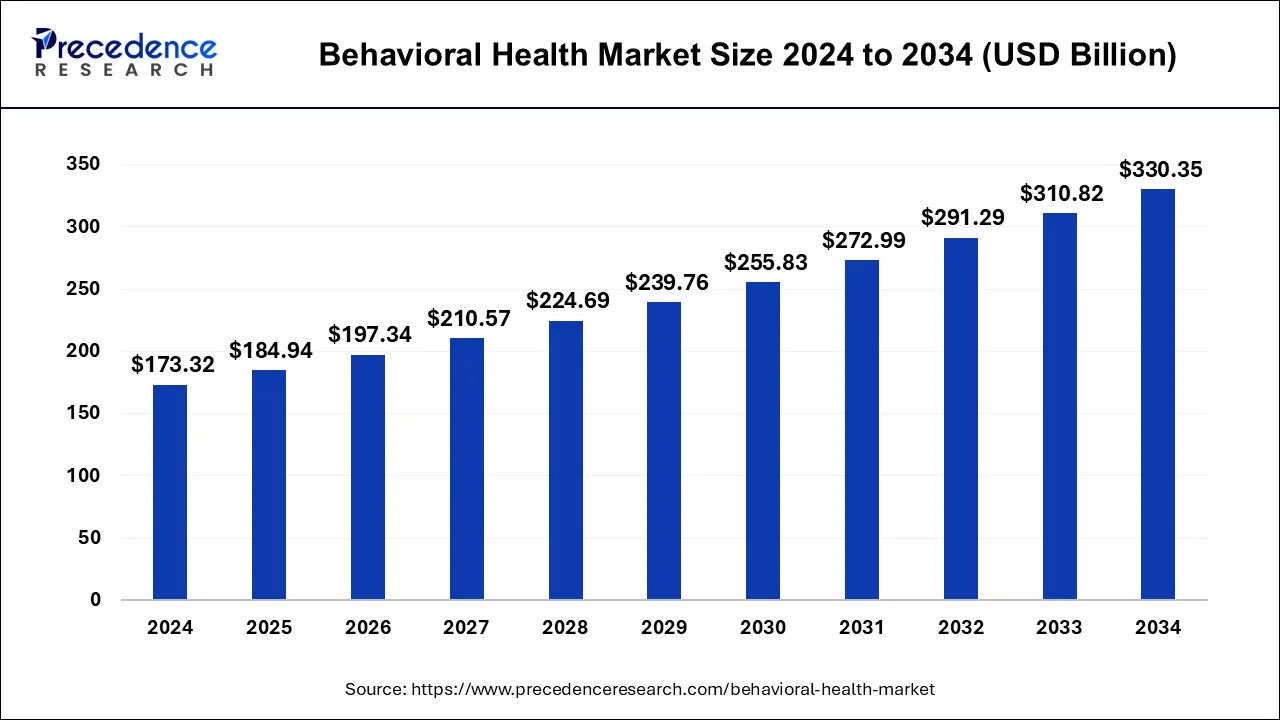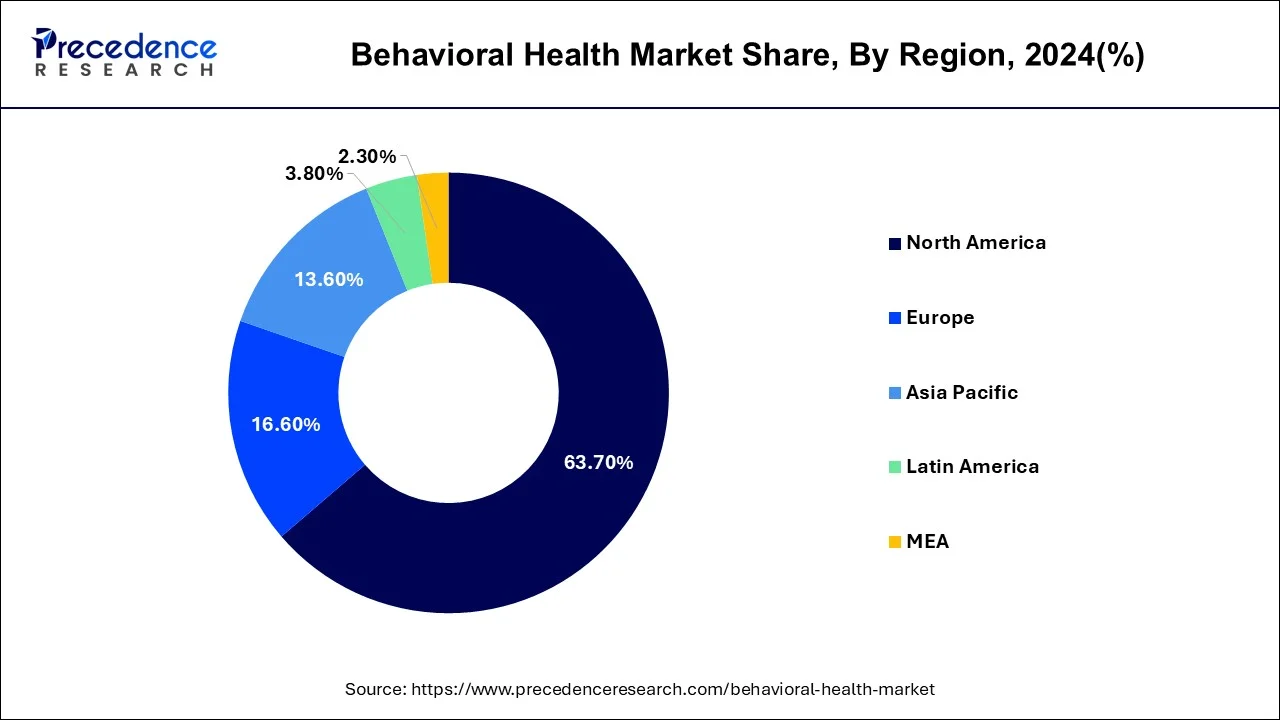The global behavioral health market size reached USD 162.31 billion in 2023 and is projected to hit around USD 310.82 billion by 2033, expanding at a CAGR of 6.71% from 2024 to 2033.

Behavioral Health Market Regional Insights
- North America:
- Dominated the global behavioral health market in 2023 due to high prevalence of mental health issues.
- Advanced healthcare systems, significant awareness, and substantial healthcare spending drive growth.
- Asia Pacific:
- Fastest-growing market, projected to increase from USD 28.21 billion in 2023 to USD 58.43 billion by 2033.
- Rising cases of mental health disorders due to physical health issues, disability, and substance abuse.
- High youth population and increasing alcohol and drug consumption contribute to market growth.
- Economic development and increasing per-capita healthcare expenditure boost the market.

Get a Sample: https://www.precedenceresearch.com/sample/1174
Key Factors Driving Growth
- Increased Prevalence of Mental Health Issues:
- Approximately 36% of the U.S. population experiences some form of mental disorder in their lifetime.
- Rising cases of depression, anxiety, and substance abuse.
- Technological Advancements:
- Rapid adoption and implementation of advanced products and technologies in behavioral health treatment.
- Substance Abuse:
- Significant rise in substance use disorders, with 1 in 4 individuals affected.
- Around 31.9 million people use illegal drugs, with 8.1 million having a drug use disorder.
- Suicide Rates:
- Suicide rates increased by about 35% from 1999 to 2018.
- Suicide is the tenth-leading cause of death in the U.S., often linked to depression and anxiety.
- Healthcare Infrastructure and Expenditure:
- Developed healthcare infrastructure and higher healthcare expenditure support market growth.
- Improved access to mental health services and increased awareness.
- Aging Population:
- Growing geriatric population contributing to the demand for mental health services.
Read more: Cosmeceuticals Market Size to Reach USD 128.54 Bn By 2032
Behavioral Health Market Current Trends
Increased Awareness and Acceptance
In recent years, there has been a notable shift in societal attitudes towards mental health. The stigma surrounding mental health issues is gradually diminishing, leading to increased acceptance and a willingness to seek help. Public figures and campaigns advocating for mental health awareness have played a crucial role in this change, encouraging individuals to prioritize their mental well-being.
Advancements in Telehealth
The integration of telehealth into behavioral health services has revolutionized the way care is delivered. Telehealth platforms provide remote access to mental health professionals, making it easier for individuals to receive therapy and counseling without the need to travel. This is particularly beneficial for those living in rural or underserved areas, ensuring they have access to quality care.
Personalized Treatment Plans
The trend towards personalized medicine is also evident in the behavioral health market. Tailored treatment plans that consider an individual’s unique genetic makeup, lifestyle, and preferences are becoming more common. This personalized approach enhances the effectiveness of treatments and improves patient outcomes.
Emphasis on Preventive Care
There is a growing focus on preventive care in behavioral health. Early intervention and proactive management of mental health conditions can prevent the escalation of issues and reduce the overall burden on healthcare systems. Programs aimed at promoting mental wellness and resilience are gaining popularity, emphasizing the importance of maintaining good mental health.
Behavioral Health Market Challenges
Access to Care
Despite the advancements, access to behavioral health services remains a significant challenge. Many individuals still face barriers such as lack of insurance coverage, high costs, and long waiting times. Addressing these issues is critical to ensuring that everyone who needs care can receive it in a timely manner.
Workforce Shortages
The behavioral health sector is experiencing a shortage of qualified professionals. This shortage impacts the ability to meet the growing demand for services, leading to burnout among existing practitioners and potentially compromising the quality of care. Strategies to attract and retain mental health professionals are urgently needed.
Integration with Primary Care
Integrating behavioral health with primary care is essential for providing holistic treatment to patients. However, achieving seamless integration poses challenges, including coordinating care between different providers, managing patient data, and ensuring that primary care physicians are adequately trained in recognizing and addressing mental health issues.
Funding and Reimbursement Issues
Adequate funding and reimbursement for behavioral health services are ongoing challenges. Many mental health providers struggle with low reimbursement rates from insurance companies, which can limit their ability to offer comprehensive services. Advocacy for better funding and reimbursement policies is crucial to support the sustainability of behavioral health services.
Behavioral Health Market Opportunities
Technological Innovations
Technology continues to offer new opportunities for the behavioral health market. Innovations such as artificial intelligence (AI) and machine learning are being used to develop predictive models for mental health conditions, improve diagnostic accuracy, and create personalized treatment plans. Additionally, mobile apps and wearable devices are providing new ways for individuals to monitor and manage their mental health.
Expansion of Behavioral Health Programs
There is significant potential for expanding behavioral health programs within schools, workplaces, and communities. Implementing mental health programs in educational institutions can provide early intervention for young people, while workplace programs can support employee well-being and productivity. Community-based initiatives can increase access to care and support overall mental wellness.
Collaboration with Non-Profit Organizations
Non-profit organizations play a vital role in addressing mental health needs, especially for vulnerable populations. Collaborating with these organizations can enhance the reach and impact of behavioral health services. Non-profits often provide essential services such as crisis intervention, support groups, and advocacy, complementing the work of traditional healthcare providers.
Policy Advocacy and Reform
Advocating for policy changes at the local, state, and national levels can drive significant improvements in the behavioral health market. Policies that support increased funding, better reimbursement rates, and the integration of mental health services into primary care can create a more robust and accessible system for all.
Behavioral Health Market Leading Companies
- Acadia Healthcare Co.
- Universal Health Services, Inc.
- Magellan Health Inc.
- National Mentor Holdings Inc.
- Behavioural Health Services Inc.
- Behavioural Health Network Inc.
- North Range Behavioural Health
- Seton Healthcare Family (Ascension Health)
- Ocean Mental Health Services
- Beacon Health Strategies
- Others
Segments Covered in the Report
By Service Type
- Home-Based Treatment Services
- Outpatient Counselling
- Emergency Mental Health Services
- Inpatient Hospital Treatment
- Intensive Care Management
By Disorder Type
- Bipolar Disorder
- Anxiety Disorder
- Depression
- Post-Traumatic Stress Disorder
- Eating Disorder
- Substance Abuse Disorder
- Others
By End-Users
- Outpatient Clinics
- Hospitals
- Rehabilitation Centers
- Homecare Setting
By Regional Outlook
- North America
- US.
- Canada
- Europe
- UK.
- Germany
- France
- Rest of Europe
- Asia Pacific
- China
- India
- Japan
- South Korea
- Rest of Asia Pacific
- Latin America
- Brazil
- Rest of Latin America
- Middle East & Africa
- GCC Countries
- North Africa
- South Africa
- Rest of Middle East and Africa
Immediate Delivery Available | Buy This Premium Research Report@ https://www.precedenceresearch.com/sample/1174
